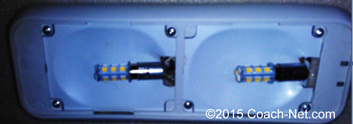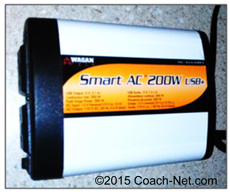Tags
 There have been many articles written about how to extend RV battery life while dry camping. Many of these involve the addition of batteries and solar panels. While these articles are great for do-it-yourselfers who have the time and money, for many of us this is either not desirable or not an option, given space, time, ability, or cost limitations. In this column, I will provide alternative tips that are inexpensive and simple and don’t require modifications to your RV.
There have been many articles written about how to extend RV battery life while dry camping. Many of these involve the addition of batteries and solar panels. While these articles are great for do-it-yourselfers who have the time and money, for many of us this is either not desirable or not an option, given space, time, ability, or cost limitations. In this column, I will provide alternative tips that are inexpensive and simple and don’t require modifications to your RV.
First, I will discuss the batteries themselves. Although some recreational vehicles have space for four or more batteries, many, such as vans and small trailers, can only accommodate two, at least without significant modification. It is sometimes possible to add additional batteries, but it will normally be at the cost of storage or other ancillary space. Therefore, many RV owners are limited in the number of batteries they have on board. The best advice I can offer in this case is to use 6V batteries instead of 12V. 6V batteries have a higher and better current capacity than 12V due to the larger plates, which results in a slower discharge rate.
In terms of the battery loads, the primary ones are the furnace, lights, LP detector, fridge and water heater control boards, vent fans, other 12V appliances, and inverter loads. With the exception of large inverter loads, the heaviest battery draw is generally the furnace blower. If you are camping in colder weather, you can minimize furnace use by turning down the thermostat, dressing warmer during the day, and using a heavier comforter or sleeping bag at night. The furnace tends to be a strain on the coach batteries, so this energy saving tip goes a long way.
One load that usually can’t be avoided is the interior lighting. I replaced all my interior bulbs with LED versions. I have five “standard” incandescent ceiling fixtures in my coach, each with two bulbs. Therefore, I replaced ten incandescent bulbs with LED equivalents. Doing so saves a significant amount of power, considering these bulbs consume a fraction of the current as incandescent bulbs. A word of advice though, don’t buy LED bulbs from a retail outlet or RV parts store. I purchased mine online and paid almost the same for ten as I would have for a single one at a retail store.
 12V appliances such as televisions and DVD/Blu-ray players don’t draw much power, nor do the 120V versions of these when run through a small inverter (around 200W). I highly recommend carrying at least one of these inverters in your RV, as they are also good for powering other appliances such as laptops (although you would want a true sine wave version for sensitive electronics). This is not large enough to power a coffee maker or toaster, but will work for most other things.
12V appliances such as televisions and DVD/Blu-ray players don’t draw much power, nor do the 120V versions of these when run through a small inverter (around 200W). I highly recommend carrying at least one of these inverters in your RV, as they are also good for powering other appliances such as laptops (although you would want a true sine wave version for sensitive electronics). This is not large enough to power a coffee maker or toaster, but will work for most other things.
Of course, you may choose to incorporate additional and more expensive systems, such as solar panels, which will further increase your off-grid time, but following these simple tips will allow you to significantly increase the battery life of your coach without major modifications or cost.
About the Author:
Steve Froese, an avid RV owner, traveler, and Coach-Net member since 2013, is the principal of “A Word to the Wise Technical Communications”, a published RV author, certified RV technician, and licensed Professional Engineer. He frequently collaborates with the “RV Doctor”, Gary Bunzer, and has worked with the RVIA/RVDA as a technical and training writer and consultant. Professionally, he works as a quality engineer and musician. Watch for more of Steve’s work in upcoming Coach-Net publications.


Great info! I full-time in my Roadtrek 190 P ( soon to upgrade to a CS Adventurous). My main concern with interior temperatures are 1) if I want to keep water in my interior tank, I don’t want it to freeze.
2) correlary to #1, the very poorly insulated metal shell of the chassis sucks every bit of heat out of the interior, causing the blower to do yeoman’s duty to keep the interior at 63 degrees. I have interior/exterior thermometers to monitor the situation.
As far as the status panel and the alarm panel, there’s not much to do about that. The status panel is tied into the battery disconnect switch, so there you go.
I do have a 240 w solar panel, but something most people don’t think about is dust, leaves, and road grime that will inactivate a panel, so you have to keep on top of that, which is hard to do if your rig does not have a ladder. Mine doesn’t. Ideally you should wash your panel(s) every few days, or when you get to your destination. If you want solar, but want to be able to park in the shade, there is a company that makes portable panels that you can put outside in the sun.
What are your thoughts on winter camping, water, and dealing with lousy insulation?
Thanks–Laura
LikeLike
In terms of item #1, you can supplement the furnace by adding electric heaters. You may choose to slightly open cabinet doors to allow the heat to circulate through ancillary spaces that house water lines, tanks, etc. Also make sure your propane container is kept as full as possible. This will maximize the wetted surface of the container, thereby optimizing combustion and ensuring you don’t run out of LP gas. The combination of interior wall construction and steel exterior walls does mean that the interior of Class B vans is hard to keep warm. However, interior features, such as fabric and wood, hold heat quite well, so once the inside of the van is heat saturated, the furnace does have an easier time keeping things warm. Glass, especially the windshield, is one of the biggest causes of heat loss inside an RV, so you may choose to cover the windshield with a heat shield to prevent heat loss through the large single-pane glass area. However, that does remove a major source of light and scenery, so there is a trade-off.
It is a good reminder about the solar panel. In addition to the panel though, it is prudent to check all roof fixtures such as sealants, vent covers, and skylights. After brushing off the debris, use glass cleaner on the solar panel and check the fixtures and sealants for cracks damage, bearing in mind that extremely low temperatures may break plastic parts. If you do buy an aftermarket panel, especially if it is not purchased from an RV dealer, make sure it is tempered safety glass. Some inexpensive panels are not and there many risks associated with installing such a unit on your coach.
LikeLiked by 1 person
Thank you for the great winter camping tips! Leaving the under-sink cabinet open so the water lines get more heat is a great idea. Electric heaters are wonderful if you are hooked up to power. Otherwise they draw too much current. Also, a tiny rig with a big dog doesn’t leave much room for a heater, unless I suspend it from my clothes rack, which is a possibility. No ladder on this rig and no where to put one, so that makes inspecting and cleaning the solar panel (factory installed) kind of difficult. Any tips on that one? Thanks–Laura
LikeLike
12v vs 6v batteries. What do you think of the Optima 12v agm batteries. They have as much capacity as 6v
LikeLike
Thanks for sharing this wonderful post. Loved reading it!
LikeLike
If you really what your house battery’s to last, do not draw them below 50%. Battery’s have cycles and if you draw them down you shorten their life
LikeLike